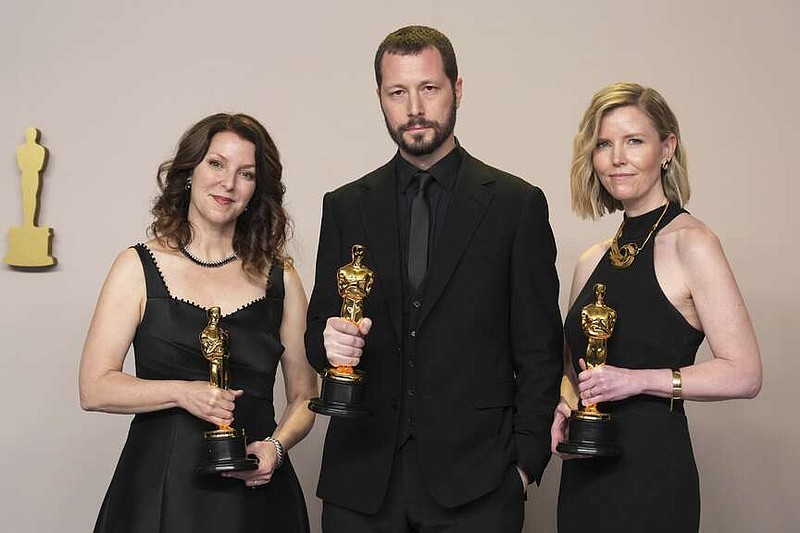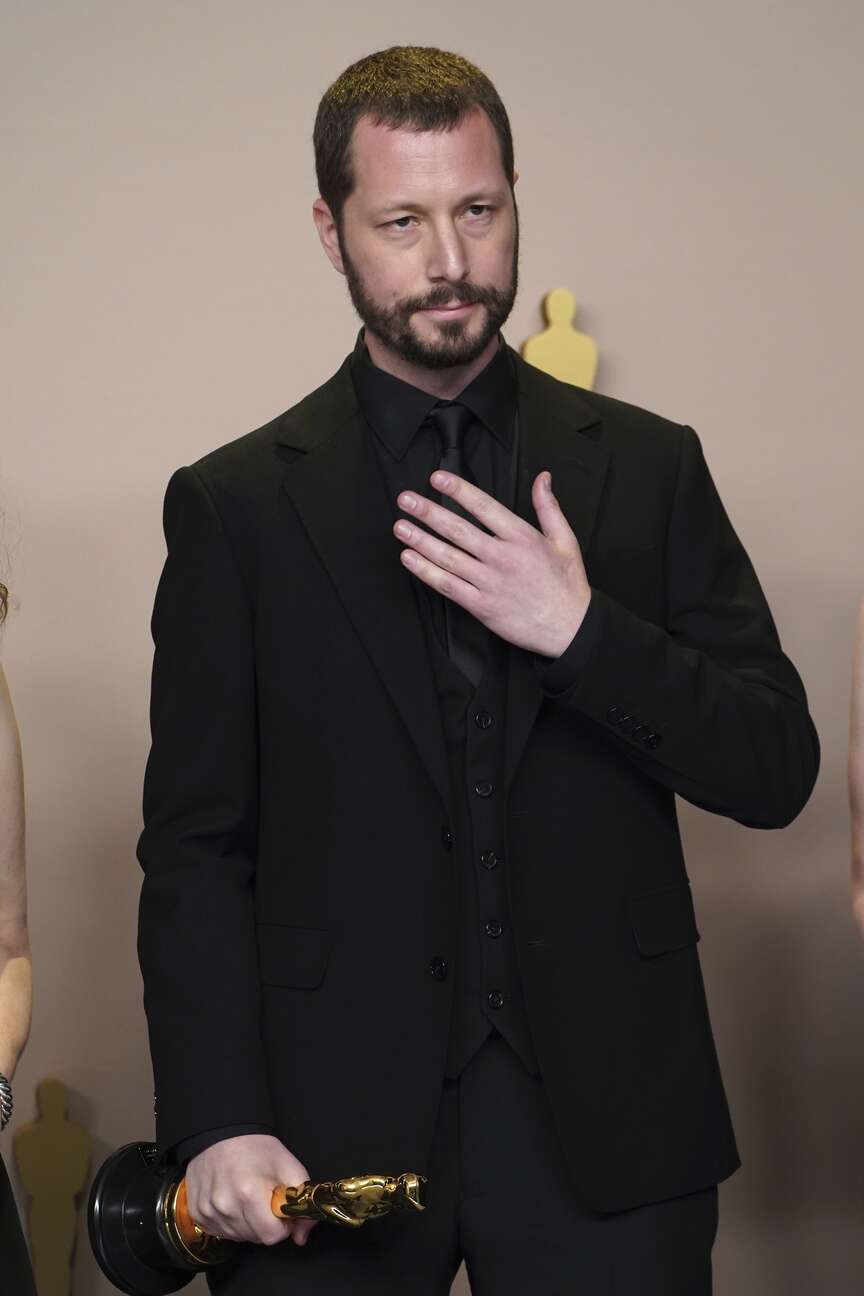KYIV, Ukraine -- Ukraine awoke Monday to another day of war -- Russian drones blasted buildings in the Kharkiv and Odesa regions -- but also the news that it had won its first Oscar.
The best documentary victory for Mstyslav Chernov's "20 Days in Mariupol," a harrowing first-person account by The Associated Press journalist of the early days of Russia's invasion in 2022, was bittersweet.
"This is the first Oscar in Ukrainian history, and I'm honored," an emotional Chernov said Sunday at the Academy Awards. "Probably I will be the first director on this stage to say I wish I'd never made this film, I wish to be able to exchange this to Russia never attacking Ukraine."
He called on Russia to cease its aggression in Ukraine. "I wish for them to release all the hostages, all the soldiers who are protecting their land, all the civilians who are in their jails," he said.
"We can make sure that the history record is set straight and the truth will prevail, and that the people of Mariupol, and those who have given their lives, will never be forgotten. Because cinema forms memories and memories form history."
Chernov ended his speech by switching to his native language, reciting his nation's salute, "Slava Ukraini," which means "Glory to Ukraine."
Back home in his native Ukraine, the award winner was applauded for exposing the brutal devastation of the war and the message Chernov had sent to the world from one of the biggest stages.
Ukrainian President Volodymyr Zelenskyy hailed the award as "important for our entire country" and said he was grateful to the team and thanked journalists across the world still covering the war despite a decrease of attention as it has dragged into its third year and as much of the world's focus has turned to Israel's war against Hamas.
"The horrors of Mariupol must never be forgotten," he said on social media. "The entire world must see and remember what the inhumane Russian invasion brought to our people. Cities and villages were destroyed, homes were burned and entire families were killed by Russian shells and buried in their own backyards."
The AP team of Chernov, photographer Evgeniy Maloletka and producer Vasilisa Stepanenko arrived an hour before Russia began bombing the port city. Two weeks later, they were the last journalists working for an international outlet in the city, sending crucial dispatches to the outside world showing civilian casualties of all ages, the digging of mass graves, the bombing of a maternity hospital and the sheer extent of the devastation.
While reporting on the invasion, Chernov encountered quite a few different reactions to the team's presence on the ground. Some thanked the journalists for doing their jobs. Some called them prostitutes. Some doctors urged them to film graphic scenes of injured and dead children to show the world what had been done.
Only about 40 minutes of footage made it out to the world in real time because of poor connections, but when Chernov and his colleagues were finally able to leave, he decided he needed to do something with the 30-some hours they had on tape. Chernov narrated the documentary as well.
The Oscar -- and nomination -- was a first for Chernov, an AP video journalist, and the 178-year-old news organization. The documentary was a joint production of the AP and PBS's "Frontline." It was the first win for "Frontline" after two previous nominations.
Statuettes were awarded to Chernov, producer and editor Michelle Mizner and producer Raney Aronson-Rath. AP Vice President Derl McCrudden, also a credited producer on the film, was among those onstage to accept the award.
Police officer Volodymyr Nikulin, who is featured prominently in the film as he helped the crew cover the story and ultimately escape Mariupol as Russian forces closed in, said he was happy the movie had won the prestigious award.
Nikulin, who was later injured helping victims of a Russian attack on Pokrovsk in the Donetsk region, ferried the crew around Mariupol in a desperate attempt to help them find a place where they could transmit their footage because he said it was vital that the world could see what was happening. He said the film served as an important reminder of "the most difficult time for our country."
"Right now, we may be facing a similarly challenging moment," he told the AP in Kyiv on Monday.
"But this film has shown that we can defend our country, that we are united. And at this time, if the world sees that we are fighting, the crimes the aggressor is committing in our country, how it destroys our cities, I believe that the world will support our efforts in the fight, and this will be decisive at this time."
The award, one of many the documentary has garnered, including the Pulitzer Prize, comes as Ukraine's forces and ammunition are depleted and Russian troops are trying to push deeper into the Ukraine-held western part of the Donetsk region and penetrate the Kharkiv region to the north.
Drone attacks overnight damaged two multistory buildings, a hotel and a municipal building in the eastern city of Kharkiv, regional Gov. Oleh Syniehubov said. No casualties were reported.
An infrastructure facility in the Odesa region was destroyed and windows were shattered, regional Gov. Oleh Kiper said.
Information for this article was contributed by Hanna Arhirova, Susie Blann, Lindsey Bahr, Christopher Weber, Anton Shtuka and Dasha Litvinova of The Associated Press.
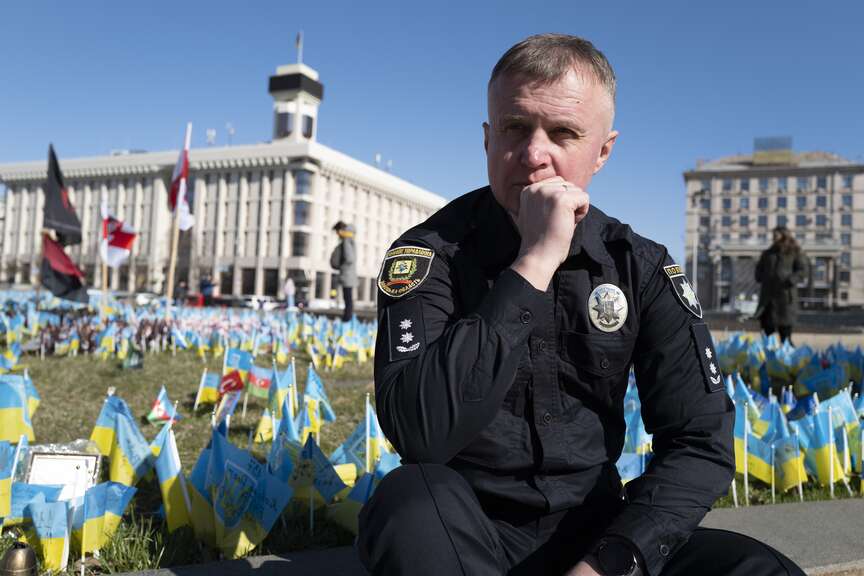 Ukrainian police officer Volodymyr Nikulin poses for a photo in downtown Kyiv, Monday March 11, 2024. Nikulin helped Associated Press journalists during the siege of Mariupol, in the early days of Russia's invasion of Ukraine in 2022, while filming "20 Days in Mariupol" which won the best documentary Oscar on Sunday night. (AP Photo/Bela Szandelszky)
Ukrainian police officer Volodymyr Nikulin poses for a photo in downtown Kyiv, Monday March 11, 2024. Nikulin helped Associated Press journalists during the siege of Mariupol, in the early days of Russia's invasion of Ukraine in 2022, while filming "20 Days in Mariupol" which won the best documentary Oscar on Sunday night. (AP Photo/Bela Szandelszky)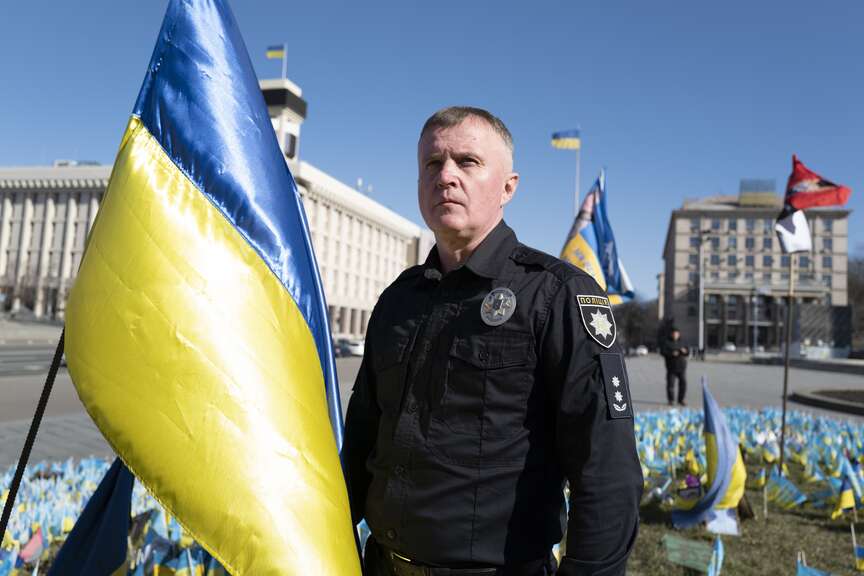 Ukrainian police officer Volodymyr Nikulin poses for a photo in downtown Kyiv, Monday March 11, 2024. Nikulin helped Associated Press journalists during the siege of Mariupol, in the early days of Russia's invasion of Ukraine in 2022, while filming "20 Days in Mariupol" which won the best documentary Oscar on Sunday night. (AP Photo/Bela Szandelszky)
Ukrainian police officer Volodymyr Nikulin poses for a photo in downtown Kyiv, Monday March 11, 2024. Nikulin helped Associated Press journalists during the siege of Mariupol, in the early days of Russia's invasion of Ukraine in 2022, while filming "20 Days in Mariupol" which won the best documentary Oscar on Sunday night. (AP Photo/Bela Szandelszky)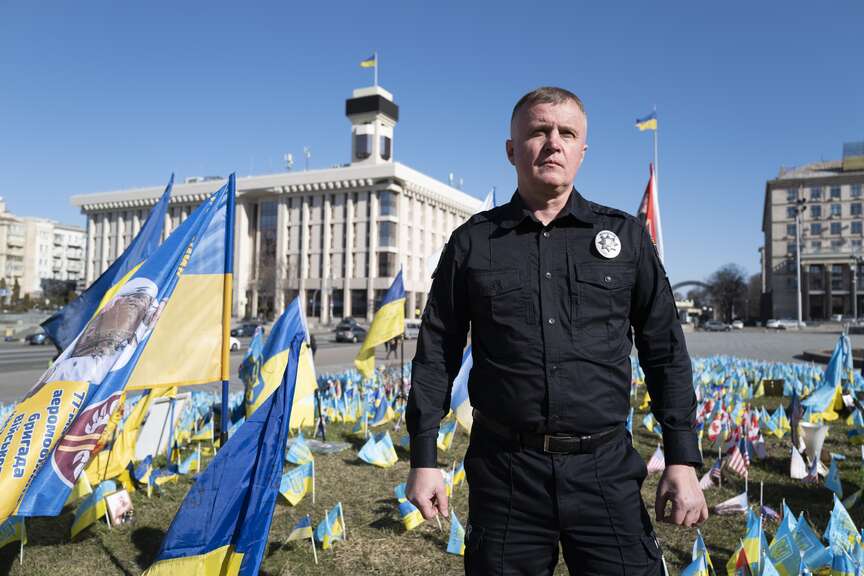 Ukrainian police officer Volodymyr Nikulin poses for a photo in downtown Kyiv, Monday March 11, 2024. Nikulin helped Associated Press journalists during the siege of Mariupol, in the early days of Russia's invasion of Ukraine in 2022, while filming "20 Days in Mariupol" which won the best documentary Oscar on Sunday night. (AP Photo/Bela Szandelszky)
Ukrainian police officer Volodymyr Nikulin poses for a photo in downtown Kyiv, Monday March 11, 2024. Nikulin helped Associated Press journalists during the siege of Mariupol, in the early days of Russia's invasion of Ukraine in 2022, while filming "20 Days in Mariupol" which won the best documentary Oscar on Sunday night. (AP Photo/Bela Szandelszky)